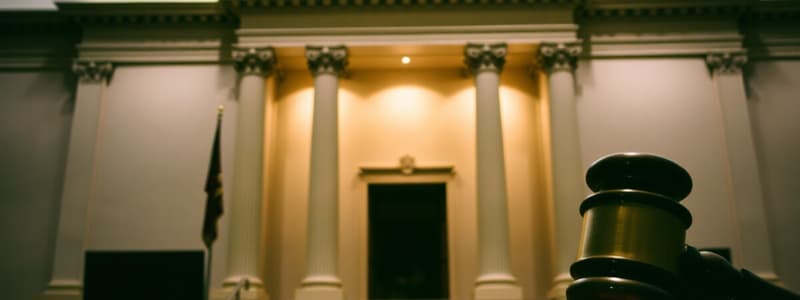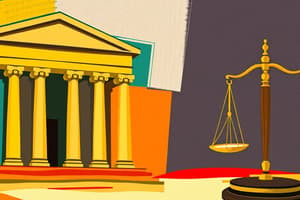Podcast
Questions and Answers
What legal principle requires courts to follow precedents set by previous decisions?
What legal principle requires courts to follow precedents set by previous decisions?
- Writ of certiorari
- Judicial review
- Judicial activism
- Stare decisis (correct)
What process involves the Supreme Court's authority to review laws or actions to ensure they comply with the Constitution?
What process involves the Supreme Court's authority to review laws or actions to ensure they comply with the Constitution?
- Judicial review (correct)
- Concurring opinion
- Writ of certiorari
- Jurisdiction
Which of the following individuals is known for being the first African American Supreme Court Justice?
Which of the following individuals is known for being the first African American Supreme Court Justice?
- John Marshall
- Clarence Thomas
- Thurgood Marshall (correct)
- Ruth Bader Ginsburg
What term describes a case that involves a dispute between private parties, typically seeking monetary damages?
What term describes a case that involves a dispute between private parties, typically seeking monetary damages?
What legal term refers to the amount of control a court has over a case based on its geographical location or the type of case?
What legal term refers to the amount of control a court has over a case based on its geographical location or the type of case?
Flashcards
Judicial review
Judicial review
The power of the courts to declare laws unconstitutional.
Precedent
Precedent
A legal decision that serves as an example and guide for future similar cases.
Plaintiff
Plaintiff
The person or party who brings a lawsuit.
Writ of Certiorari
Writ of Certiorari
Signup and view all the flashcards
Jurisdiction
Jurisdiction
Signup and view all the flashcards
Study Notes
Judicial Branch Study Guide
- Dissenting Opinion: A statement disagreeing with the majority opinion in a court case.
- Concurring Opinion: A statement agreeing with the majority opinion, but for different reasons.
- Writ of Certiorari: A formal writ used by the Supreme Court to call up a case from a lower court for review.
- Judicial Review: The power of the courts to review laws and government actions to determine their constitutionality.
- Briefs: Written arguments presented by lawyers to the court in a legal case.
- Plaintiff: The party bringing the lawsuit.
- Defendant: The party being sued.
- Precedent: A court decision that serves as an example or authority for deciding similar cases in the future.
- Judicial Activism: When judges actively shape laws and/or the interpretation of the law to reflect their policy preferences.
- Judicial Restraint: When judges are reluctant to overturn prior interpretations of law.
- Criminal Case: A legal case involving a crime.
- Civil Case: A legal dispute between two or more parties that does not involve a crime.
- Jurisdiction: The legal authority of a court to hear and decide a case.
- Original Jurisdiction: The power of a court to hear a case for the first time.
- Appellate Jurisdiction: The power of a court to review decisions made by lower courts.
- Steps to become a Federal Judge: Process to become a federal judge (details not included).
- Size of Supreme Court: Specific details on number of Supreme Court justices are not included.
- What Presidents Look For: Criteria used when nominating federal judges are not detailed.
- Federal Judge Term Length: Term length for federal judges is unknown.
- First Female Supreme Court Justice: Specifics are not included.
- First African American Supreme Court Justice: Specifics are not included.
- Article III: Specifics on the article are not included.
- Senatorial Courtesy: Specifics on senatorial courtesy are not included.
- Number of Cases Heard by Supreme Court: Case selection criteria and number of cases actually selected are not presented in detail.
- Solicitor General: Role of the Solicitor General is not presented, but mentioned.
- "Rule of Four": Decision-making criterion of the Supreme Court regarding case selection.
- Marbury v. Madison: Case establishing the principle of judicial review.
- Role of the Senate Judiciary Committee: Role of the committee relevant to the selection process for federal judges.
- Judicial Implementation: The process by which judicial decisions are applied and implemented.
- Amicus Curiae Briefs: Documents submitted by interested parties who are not directly involved in a case but have relevant expertise.
- Stare Decisis: The legal principle of adhering to precedent.
Studying That Suits You
Use AI to generate personalized quizzes and flashcards to suit your learning preferences.




